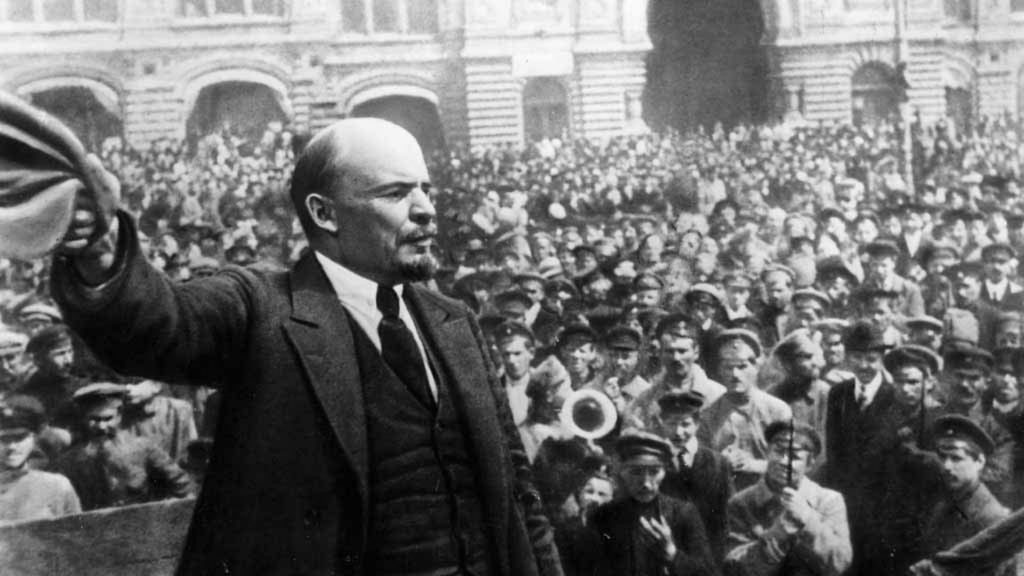Buy this Issue
The familiar story we are told about the Russian Revolution is that 1917 was an extremely violent takeover of a fledgling democracy by a small group of men bent on setting up a totalitarian regime. Barely a word of this is true, but it is what the apologists of capitalism would have us believe. Another ubiquitous notion, one just as spurious but far less often unmasked as such, is that the Russian Revolution and the Soviet Union were just a giant, failed “experiment.” This idea conjures sinister associations and serves as confirmation of age-old bourgeois constructs about human nature as capitalist, immutable, and separate from society. In actuality, however, the Revolution of 1917 was a monumental victory in the struggle of the workers and oppressed against capitalism and class society.
Based on Hegel’s notion of history as movement, Marx understood that the dialectic of history is a material process and that “the history of all hitherto existing class society is the history of class struggle.” Revolution, according to historical materialism, is necessary as long as there is class conflict. What the Russian Revolution has taught us is that the abolition of the existing order is not only historically necessary but possible under the most adverse circumstances. The Bolsheviks could not have known that their revolution would remain isolated in one country, or that the workers’ organizations in the developed countries would be defeated. This is the tragedy of the Revolution, but the consequences of this predicament and the disastrous ascent of Stalinism must not be used to discredit the immense achievements of the Bolsheviks in 1917 and the years that followed.
The course of history was changed forever when, on Leon Trotsky’s 38th birthday one hundred years ago, the Cruiser Aurora gave the signal for the storming of the Winter Palace in St. Petersburg. It marked the start of what is now known as the October Revolution. Over the next few years, the working people and oppressed masses of Russia, under the leadership of the Bolsheviks, successfully swept away the old feudal society, completing what had been set in motion during the February Revolution and leaving a deep imprint on the collective experience of communists and workers everywhere. This was a major step forward, accomplished by what Marx called the “real movement which abolishes the present state of things.”
The slogan “Peace, Bread, Land” reverberated throughout Asia, Africa, and Latin America. Freedom from imperialist war, plunder, and tyranny was no longer a utopian dream but an attainable reality. Led by Lenin and Trotsky, the communists initiated the fundamental transformation of Russian society. Within a very short time span, after pulling the country out of WWI, they turned the Soviet Union into a planned economy with modern industry and advanced science and technology. The remarkable economic growth was matched by social progress: Illiteracy and unemployment became a thing of the past. Basic goods and cultural activities were made affordable for all. New laws guaranteed the political and legal equality of women, as well as their social and economic independence through the right to an abortion, civil marriage and divorce, paid maternity leave, and childcare, and the replacement of individual domestic labor with communal labor.
One hundred years later, the legacy of the Russian Revolution still looms large. In the U.S., mainstream media outlets report that today’s youth no longer balk at the idea of socialism and are actively discussing how to end capitalism. More than 25 years after the end of the Cold War, left-wing phenomena have sprung up in the U.S. and other imperialist countries – from Occupy Wall Street, Standing Rock, and Black Lives Matter in the U.S. to Momentum in the U.K. and the “Battle of Hamburg” at the G20 summit in Germany. These movements, composed largely of young people, are asking once again “What is to be done?” Given the rise of a xenophobic and nationalist far right, the task at hand is an urgent one.
When President Trump named November 7 “National Day for the Victims of Communism,” he was issuing the latest iteration of the ruling class’s triumphalist rhetoric aimed to distract from the increasingly obvious fact that the victims of capitalism are once more raising their voices against exploitation and oppression. As it turns out, 1989 did not usher in the “end of history”; in fact, the current moment may be the beginning of a new historical period.
We cannot look to the ruling class parties for solutions. We can, however, draw on the lessons of the Russian Revolution and the Soviet Union in order to respond to the challenges of the present conjuncture. If the mass movements of workers and oppressed people are to continue to gain strength and become a truly viable historical force, we need to build a revolutionary party with a revolutionary strategy. This is the challenge today.










